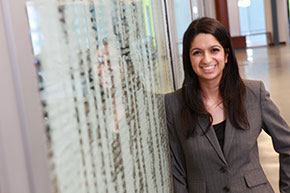Third-year accounting student Salina Dharamsi recently travelled to the United Nations to participate in a multi-stakeholder debate focused on disaster risk reduction.
The timely discussion, titled “Taking Collective Action in Disaster Risk Reduction for Good Governance – Investing in Our Children’s Future,” took place just weeks before the catastrophic earthquake in Japan and focused on developing good governance and child-centred approaches to reduce suffering and mortality levels after natural disasters.
As one of only two youth representatives at the talks, Dharamsi joined delegates from the UNDP, World Vision International, Save the Children and Unicef to speak about how to get young people engaged. As an avid volunteer for World Vision and an advocate for humanitarian and development work, Dharamsi believes young Canadians have a lot to offer.
“I think Canadian youth are really passionate,” she said. “We were the first people to engage in fair trade coffee, and the first people on board fighting climate change and animal cruelty. We are connected through Facebook and Twitter. We have networks and we know how to get things done through them by engaging each other and really working together. If you can engage youth and make them passionate about something, you can really get the message out there.”
At the UN panel, Dharamsi spoke to an audience of over a hundred about three key ways that youth can be better engaged in disaster risk reduction. She stressed the importance of providing youth with jargon-free age-appropriate information about disaster risk reduction. She also suggested that young people need tangible measures to follow in order to raise awareness. Most importantly, she said young people need to be empowered to make change and share their ideas on how to make improvements.
“Disaster risk reduction information comes from one-way communication channels for the most part, and the reality is our generation is different, we crave dialogue,” she said. “We blog, we Tweet, we Facebook. We don’t just want experts to give us information. We want the opportunity to provide information back. We want to be part of this process and to share our assets. We don’t want to work in an environment that presumes the experts have all the answers and that we’re just here to mobilize them. We have answers, too.”
Dharamsi has been doing volunteer work since she was eight years old, but her enthusiasm for humanitarian work took off after the Southeast Asian tsunami hit in 2004. Since then, she has led the 30-Hour Famine at multiple high schools, spoken at various events, and volunteered in Vancouver’s economically challenged Downtown Eastside as well as Canuck Place.
She has also taught in the slums of Guatemala, and visited widows’ cooperatives, schools and nutrition clinics in Rwanda. Throughout these experiences, Dharamsi was constantly trying to find ways that youth can be involved in humanitarian work.
When she entered Sauder, Dharamsi also tried to find ways in which business students can use their unique knowledge and experience to make a difference in the developing world.
“It’s all about this global responsibility that will make us better business people,” she said. “The business of tomorrow is ethical business. It is business that is good for the planet—it’s triple bottom line: good for the planet, good for the people and it still makes a profit.”
Moreover, Dharamsi believes Sauder students have different expertise to offer than other UBC students.
“We’ve seen a lot of these issues being tackled by international development students, political science students and arts students, and that’s great, but business students should be playing a lead role in finding solutions to the world’s problems too,” she said. “Because we have different credentials, we’ve had different courses, and we’ve been exposed to economic development, we can offer a different set of assets to the issues.”
Dharamsi admits juggling a full course load with her volunteer work is no easy task, and it will only get harder this summer, when she starts interning at KPMG. Moreover, in several months’ time, she may be participating again in a similar international discussion. However, she believes that when you know your true passion, you will make time for it no matter what.
“We see that a lot at Sauder,” she said. “People who are really giving up their time and trying to build themselves into people who are not only at the school to learn business, but for a better purpose, and I think that’s really important.”
Online: http://www.sauder.ubc.ca/News/Features_Stories/Features_Stories_Item_-_Disaster_risk_reduction

Recent Comments